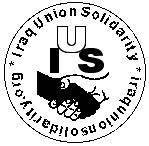27 August 2007
PRESS RELEASE
For Immediate Use
IRAQI OIL-WORKERS HAVE A RIGHT TO REPRESENTATION, SAYS MSP
Bill Wilson, MSP for the West of Scotland region, today lodged a Parliamentary Motion condemning the recent banning of oil trade unions in Iraq.
Speaking after lodging it, Dr Wilson said that he had been following developments in Iraq with great concern for some time. “An apparently logical explanation for what has happened and is happening in Iraq would be that the UK and US governments’ main preoccupation is the profits of multinational companies. With Iraq full of foreign troops the Iraqi government’s policies are almost certainly approved by — if not directly dictated by — Washington and Westminster, so the recent directive, banning oil companies from dealing with trade unions, is likely to be their policy. This appears aimed at silencing legitimate opposition to the proposed oil law, a law which would effectively sign away the control of Iraq’s oil industry to foreign interests for the next 30 years.
“The UK government claims to believe in the rule of law but the directive violates Iraq’s own constitution and ILO Convention 98 (on the Right to Organise and Collective Bargaining), which Iraq has ratified. To avoid accusations of hypocrisy and complicity our government should, at the very least, express strong disapproval of the Iraqi oil minister’s actions. Iraqis not only have the right to control their country’s resources but they also need a decent share of the oil revenue in order to reconstruct their shattered country. Iraq oil-workers must be allowed to say as much through their legitimate representative bodies, the oil trade unions.”
Dr Wilson concluded his remarks by saying, “If anyone doubts the anti-democratic regressive nature of recent developments in the Iraq I would point out that the most recent directive banning oil companies from dealing with trade unions is a repeat of the Coalition Provisional Authority’s Decree 8750, issued by the occupational forces in 2003 to prevent public-sector oil workers from forming trade unions. This, in turn, can be genealogically traced to Saddam’s Decree 150, which banned all public-sector unions. The Iraqi government, with the apparent tacit support of the UK and the USA, is effectively employing the tools of suppression used by Saddam Hussein.”
BACKGROUND INFORMATION
1. Full text of current motion
Date of Lodging: 27 August 2007
Short Title: Iraq: Banning of Oil Unions
S3M-00388 Bill Wilson (West of Scotland) (SNP): That the Parliament notes with alarm the recent directive issued by the Iraqi oil minister, Hussein Shahrastani, banning oil companies in that country from dealing with trade unions and ordering them to exclude trade unionists from work committees; notes that, under a democratic system of government, workers have the inalienable right to organise; further notes that the affected trade unions were objecting to the oil law currently being proposed which would effectively transfer control of Iraq’s oil reserves to multinational companies for the next 30 years, and further notes that the citizens of democratic nations have the right to protest against the usurpation of vital national resources regardless of inconvenience to the plans of governments or multinational companies.
2. ITUC Letter to Iraqi Prime Minister on Violation of Oil Workers Union Labor Rights
by Guy Rider, General Secretary, International Trade Union Congress
http://www.uslaboragainstwar.org/article.php?id=14353
3. Previous Iraq-related motions lodged by Bill Wilson
Date of Lodging: 2 July 2007
Short Title: Hassan Jumaa: Visa Application
Bill Wilson (West of Scotland) (SNP): That the Parliament notes with grave concern the UK's government's rejection of a visa application by the President of the Iraqi Federation of Oil Unions, Hassan Jumaa Awad al Assadi; notes that this is happening at a time when that country and its oil sector workers are under pressure to accede to the private development agendas of multinational companies through exclusive contracts lasting up to 30 years; notes that these corporate interests have been represented by the governments of the UK and the USA and through the current Iraqi Hydrocarbon Law which they have been party to since July 2006; notes specifically in this regard that Admiral William Fallon (Commander of US Central Command) insisted to Prime Minister Maliki that a new Oil Law be signed by the end of July; further notes that this proposed Oil Law effectively cedes the state's sovereignty and control over the development of the majority of Iraq's oil reserves to multinational companies and so contends that denying Hassan Jumaa's visa application at this time amounts to denying the people of Iraq a fair opportunity to present their objections to an international audience and to denying the UK electorate balanced information on developments in Iraq.
Date of Lodging: 18 June 2007
Short Title: Iraq: Right to Strike
S3M-00194 Bill Wilson (West of Scotland) (SNP): That the Parliament notes with grave concern the death threats against members of the Iraqi Federation of Oil Unions (IFOU) who were recently protesting against the proposed oil law which would effectively cede control of Iraq’s oilfields to multinational companies; further notes that the right to strike is protected by the core conventions of the International Labour Organisation, to which the Iraq Government is a signatory, and accordingly expresses its support for calls for the threat of violence against the oil workers to be withdrawn and for their legitimate right to strike to be recognised should they choose to exercise it.
Date of Lodging: 18 June 2007
Short Title: Iraq: Privatisation of Oil
S3M-00195 Bill Wilson (West of Scotland) (SNP): That the Parliament notes with concern proposals to pass laws allowing the privatisation of Iraq’s oil industry; notes that both the Blair and Bush administrations stated that their declared major purpose for invading Iraq was to remove weapons of mass destruction and that the invasion was not motivated by that country’s oil reserves; notes that both administrations have stated their support for the introduction of democracy in Iraq, and accordingly is confident that the UK and US administrations will demonstrate their good intentions by encouraging the Iraq Government not to privatise that country’s oil but to maintain it as a source of income to help Iraq’s reconstruction and recovery.
-ends-
Subscribe to:
Post Comments (Atom)







No comments:
Post a Comment